Yves here. Poland would likely agree with Henry Kissinger’s observation, “It may be dangerous to be America’s enemy, but to be America’s friend is fatal.” As John Helmer explains, Poland has a litany of grievances about American and NATO, including that the US is openly trying to turf out the current government, hasn’t pressed the EU for payment of at least some of the withheld subsidies in light of Poland being the first port of call for Ukraine refugees (Poland is in the EU’s doghouse for objecting to the ECJ having final legal say), and having to pay full freight for US weapons when NATO is not set up to protect Poland from the bad Russian bear. For more on the last issue, the second half of this article contains the translation of a lengthy, no-holds-barred interview of Polish army general Miecyslaw Gocul, who among other things was Poland’s former chief of General Staff, on the considerable deficiencies of NATO, particularly its command structure.
By John Helmer, the longest continuously serving foreign correspondent in Russia, and the only western journalist to direct his own bureau independent of single national or commercial ties. Helmer has also been a professor of political science, and an advisor to government heads in Greece, the United States, and Asia. He is the first and only member of a US presidential administration (Jimmy Carter) to establish himself in Russia. Originally published at Dances with Bears
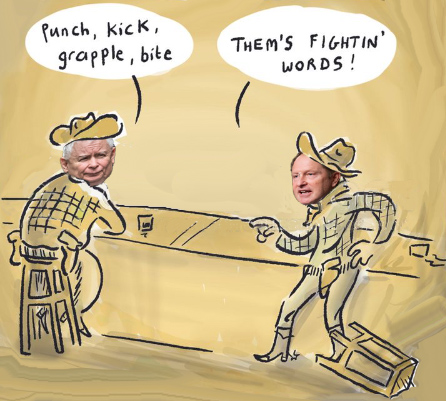
The Poles have always had a serious problem with their neighbours.
They have the Germans on their western flank, the Russians on their eastern flank, and inside their borders there used to be the Jews, but now there are the Ukrainians. In September 1939 there were about 3.3 million Polish Jews. Since February 24 of this year, the Ukrainians in Poland have come to the same number.
The war which the Polish government and military have been fighting against Russia is proving to be almost worthless politically to Law and Justice (PiS), the ruling party in Warsaw; and also to the Civic Platform (PO) and its allies, the principal opposition coalition (KO). The PiS was 15 percentage points ahead of the KO in the voter polls a year ago, 35% to 20%; the margin between them now is 11 points, 38% to 27%. The gains for each are close to the margin for statistical error.
Economically, the war is costing much more in public outlays for the refugees than the value of US and NATO arms flows and related war income. By the time Warsaw pays for its new US weapons, it will owe more than when the war started; and there is still no relief from the European Union funding freeze and penalties.
What’s to be done, the Poles ask themselves – and who’s to blame when they realise the answer is something between not much and nothing.
The principal American in Poland Ambassador Marek (Mark) Brzezinski, has recently called for regime change in Warsaw. He said it this way: “I look at the way we cooperate with the Polish government in a completely different way. We have been consistent in our commitment to security, democracy, values, the economy and people-to-people contacts. One is not subordinate to the other. And we can do several things at the same time. There is no doubt that we unequivocally support Poland in terms of security. There is also no doubt that our approach to the issue of Polish democracy is the same…The priority issues that we see in Poland are equal for us in terms of value. We have worked together as friends in each of these areas: security, democracy, the rule of law, the economy, people-to-people contacts. We are grateful to President Andrzej Duda for some of the actions taken. As President Biden said in Poland, each of us has a job to do. In the Biden administration, we are also working on our democracy and the rule of law. ”
What the Polish audience understands Brzezinski is saying is that “democracy and the rule of law” mean the replacement of the PiS and its leader, Jarosław Kaczynski. By Polish “democracy” Brzezinski doesn’t mean Lewica, the coalition of Poland’s left parties, which are currently drawing 10% in the polls. The US, according to Brzezinski, is as ungrateful to President Duda for most of what he and the PiS are doing as the US is grateful for “some”. As for the Polish economy, it is going to pay $14.1 billion for its new F-35 fighter aircraft, Abrams tanks and Patriot missiles without discounts or domestic production offsets. By “people-to-people” contacts, what the US ambassador means is his special relationship with the sworn rival of the PiS in next year’s campaign, Rafał Trzaskowski; he is the Warsaw city major since 2018 and PO presidential candidate in 2020, when Duda narrowly defeated him.
For more on Duda’s trip to Kiev and his speech to the Verkhovna Rada on May 22, read this. For the March 15 meeting which Prime Minister Mateusz Morawiecki and PiS leader Kaczynski say they held in Kiev with Ukrainian officials, along with the Slovenian and Czech prime ministers, click to read the backfile.
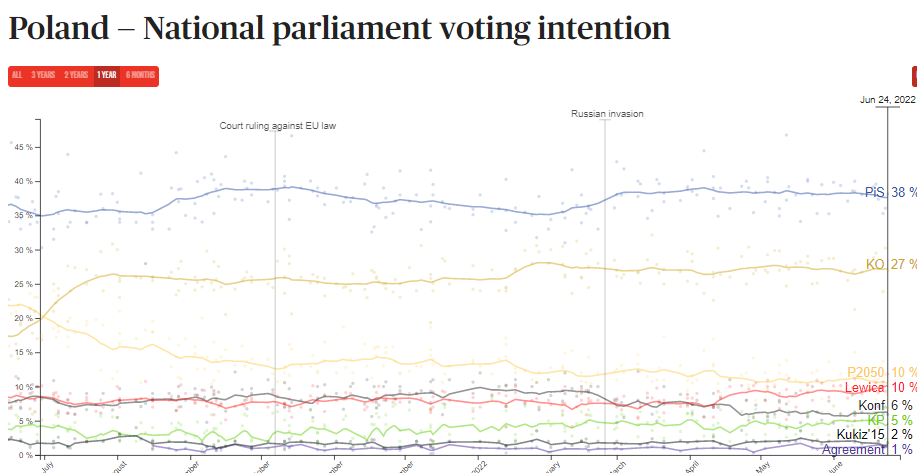
For a summary of the Polish political lineup and the party acronyms, click to read. For the poll tracking and enlargement of the chart, click to view.
Warsaw political analyst Stanislas Balcerac, a political independent, believes the PiS is likely to lose next year’s election. That, he says in a newly published article in Warszawska Gazeta, is because it lacks majority voter support, and will be unable to recover it so long as the eastern Polish regions, where the PiS strength was demonstrated in the presidential election, remain the main source of PiS voter support. Balcerac’s recommendation is that Duda and Morawiecki invoke the emergency powers of the Polish Constitution and postpone the election.
MAIN CITIES OF POLAND
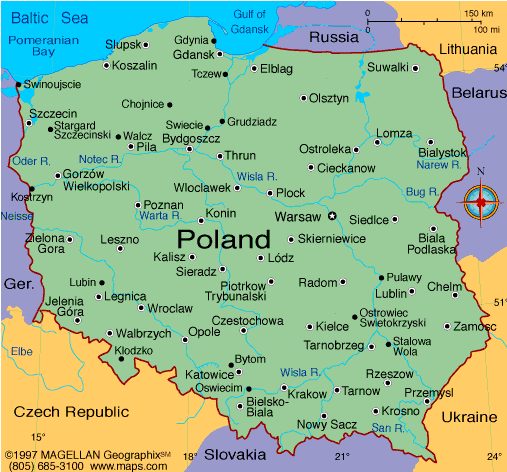
EAST-WEST DIVIDE — HOW THE POLISH REGIONS VOTED IN THE 2020 PRESIDENTIAL ELECTION
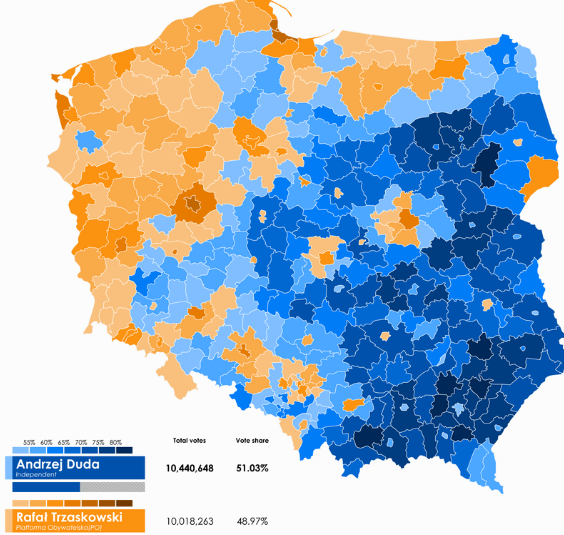
Source: https://en.wikipedia.org/
For the eastern vote for PiS, read this.
CONCENTRATION OF UKRAINIANS IN THE POLISH CITIES
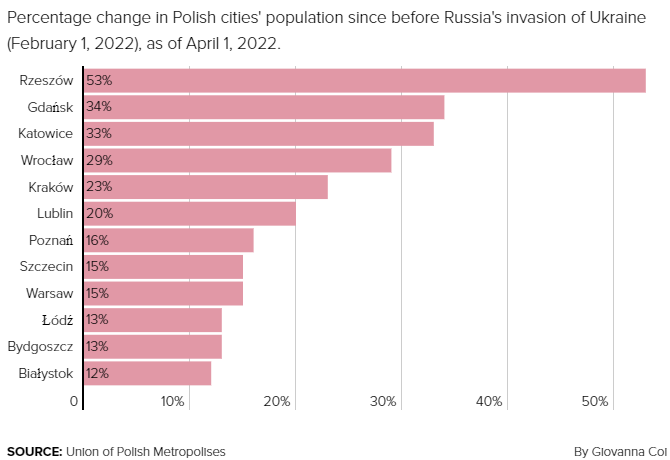
Source: “Urban hospitality -- rapid growth, challenges and opportunities”, Report on Refugees from Ukraine in the largest Polish Cities, Centre for Analysis and Research of the Union of Polish Metropolises, April 2022.
Balcerac writes: “Although the war has established itself in our country for good, it has not changed the attitude of the opposition. Instead of supporting the government in strengthening the country’s defenses, they are engaged only in attacking it. Poland is already involved in the war in Ukraine as a logistics platform. It also has a war on its border with Belarus. A front-line country involved in a war should have a state of emergency or martial law on its territory, so that the state can control its territory and fight against diversion and disinformation. According to Article 228 of the constitution of the Republic of Poland, during a state of emergency and within ninety days after its end, the term of office of the Sejm [Polish parliament] may not be shortened, a nationwide referendum may not be held, elections to the Sejm, the Senate, local government bodies and elections of the president of the republic may not be held, and the terms of office of these bodies shall be extended accordingly.”
ARTICLE 228 OF THE POLISH CONSTITUTION
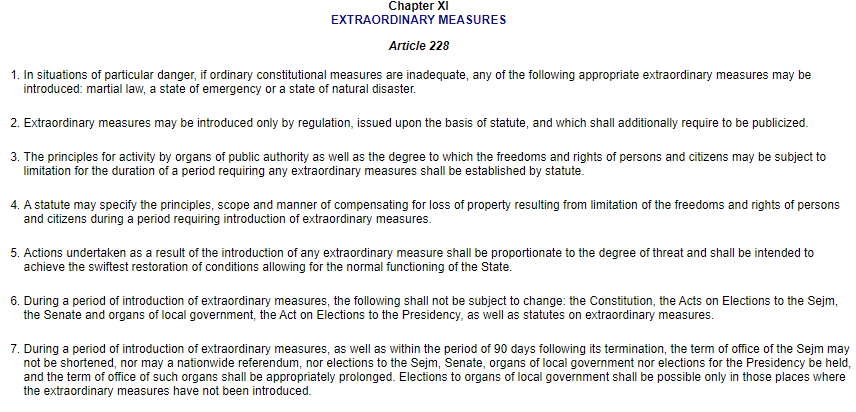
Source: https://www.sejm.gov.pl/
Balcerac continues: “For comparison with Poland, Lithuania introduced a state of emergency not on the 3-kilometer strip near the border with Belarus, but on the entire territory of the state. What impact does the war have on the behavior of Polish voters? In the latest electoral polls, PiS gets 34.2% of the vote (according to the United Surveys poll for Virtual Poland), 34.5% of the vote (according to IBRIS for Rzeczypospolita), 36% (according to Kantar for TtvN ) and 38% (Estimator poll for DoRzeczy.pl).”
“We don’t see too much of a war bonus here; that’s to say, there is no wall of voters backing he PiS government and the state’s defense policy. ‘We must win this war,’ Jarosław Kaczyński said in mid-June in Gazeta Polska. But if a front-line country like Poland is to win this war, the government must have strong support from its citizens. 34% percent of the vote does not give such support, and this is a worrying sign before the 2023 elections. Part of the media has already begun to carve up the carcass of the bear and speculate about the loss of power by the PiS. ‘With the PiS there is no chance of independent rule. The opposition has a chance if it would be able to form a majority coalition,’ wrote the weekly Wprost on June 22. The problem is, however, that if the PiS were to lose its parliamentary majority in the 2023 elections and seek a coalition, it would have to seek compromises with the PSL [agrarian Polish People’s Party], the Left, or the Confederation [far right]. Except that according to the IBRIS poll, the Confederation would have trouble getting over the 5% electoral threshold. However, in the face of war with Russia and in the current party system in Poland, it must be said that the capacity of the PiS to form a coalition with a majority in parliament is close to zero.”
PARTY STANDINGS IN THE CURRENT SEJM AND POLISH SENATE
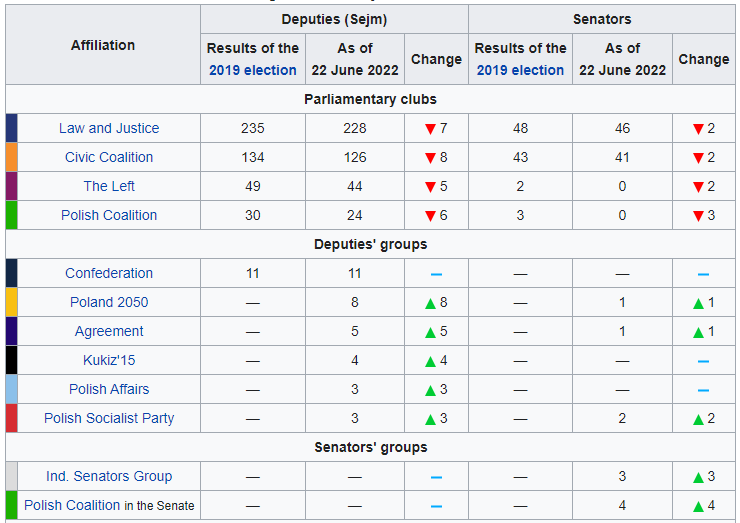
Source: https://en.wikipedia.org/wiki/Sejm
Balcerac: “Poland is being played on from several sides. On the one hand, the Russian invasion of Ukraine causes an increase in the prices of energy raw materials, and the acceleration of inflation is being exploited by the opposition. On the other hand, the European Union bureaucracy manipulated by Berlin is blocking the disbursement of EU funds to Poland; that too is being exploited by the opposition.”
“In addition, our biggest ally, the United States, is playing a double game, dreaming up plans for regime change in Warsaw. This is evident from the activity of US Ambassador Marek Brzezinski, who spends more time praising the opposition than talking to government representatives. Example: a few days before the provocation by [Civic Platform] MP Klaudia Jachira in the Sejm, Ambassador Brzezinski posed for photos with Jachira in his residence, with his arm around her.”
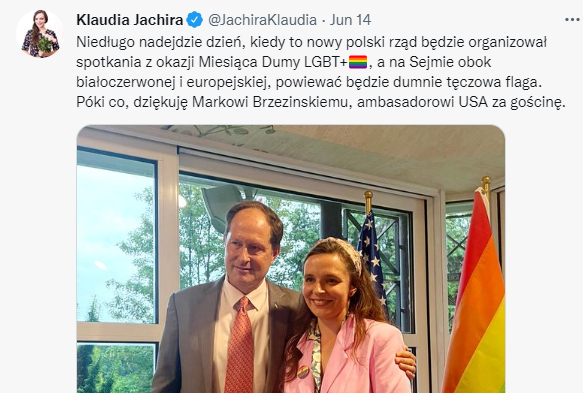
June 14 – Brzezinski embraces Jachira at his residence. Behind him is the US flag, behind her, the LGBT flag. Jachira’s tweet says: “Soon the day will come when the new Polish government will organize meetings on the occasion of the LGBT+ Pride Month, and at the Sejm, next to the [Polish] white-red and European [flags], the rainbow flag will proudly fly. In the meantime, I thank Mark Brzezinski, the U.S. ambassador, for his hospitality.”
“Everything points to the fact that billions in arms contracts for the USA, which [Defence] Minister [Mariusz] Błaszczak signs in a batch and without offsets, do not arouse American reciprocity in feelings towards the PiS government. Before the ordered military equipment will reach Poland, the country may already be ruled by a completely different team. It is symbolic that while Minister Błaszczak is sweating over the US terms in the arms contracts, the Americans are organizing high-level meetings in Washington for Rafał Trzaskowski; for example, at the end of April he met with House Speaker Nancy Pelosi.”
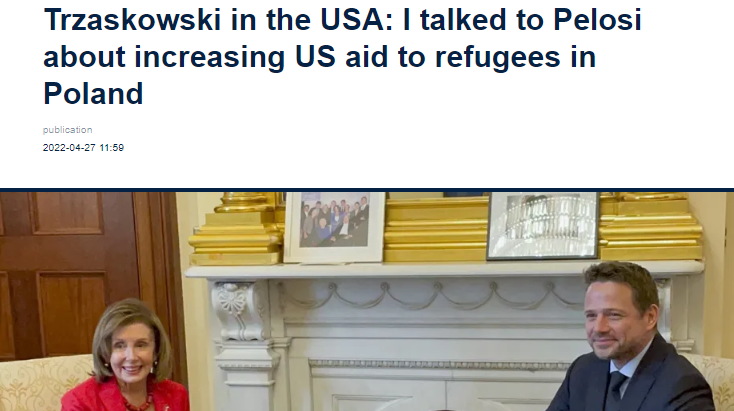
Trzaskowski in Pelosi’s office at the Capitol, April 27, 2022.
“[Security service spokesman Stanislav] Zharyn and the [Secret Services Minister Mariusz] Kamiński should learn from the recent electoral defeats of the pro-Ukrainian governments in Slovenia and Bulgaria. Prime Minister of Slovenia Janez Jansa was accompanied by Jarosław Kaczyński and Mateusz Morawiecki on their famous expedition to Kiev in mid-March. A month later, his party lost the parliamentary elections to the left. In turn, in Bulgaria, after a vote of no confidence in the Bulgarian parliament, the government of Prime Minister Kiril Petkov collapsed a few days ago. TVP Info wrote ‘the Gazprom party has overthrown the government of Bulgaria’. According to TVP Info, it is the pro-Russian president of Bulgaria Rumen Radev, ‘supporter of cooperation with Moscow’ may again be the biggest winner of the next phase of the political crisis in the country…After Slovenia and Bulgaria, the next on the Russian list will probably be Poland. And what is most interesting of all — the regime change in Poland will be carried out with the help of the American TvN station established under the supervision of Russian services. And no one even dares to write about the interference of the Kremlin.”
“So far, the PiS government does not seem to be aware of the danger. Spokesman Zharyn minimizes the Russian threat… and the government naively assumes that the 2023 election campaign conducted in the front-line country, where powerful foreign influence agencies operate, will be fair and democratic. We are faced with an impending disaster.”
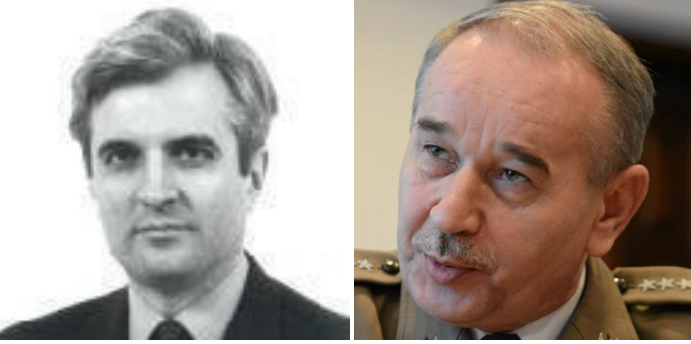
Left: Stanislas Balcerac; right, General Mieczysław Gocuł.
Also in Warsaw this week, the most widely watched public television channel, TVP Wiadomości, broadcast a lengthy interview with Polish army general Miecyslaw Gocul. He is a tank commander who rose to be chief of the Polish General Staff for two terms between 2013 and 2017. Gocul also served in staff training roles in Canada and in the UK. His only career exposure to hostile fire was in Iraq, under US command in 2003-2004.
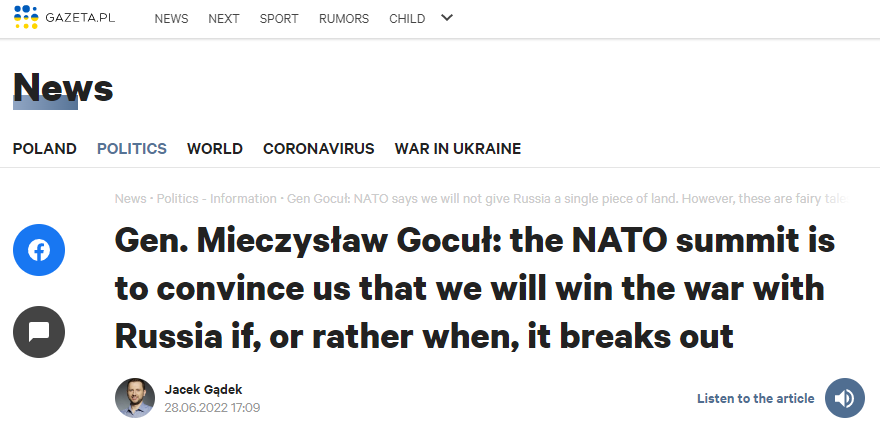
Source: https://wiadomosci.gazeta.pl/
Here is an English translation of excerpts of Gocul’s interview, published in Warsaw on June 28, as the NATO summit got under way in Madrid.
“I am very concerned that the NATO summit in Madrid is going in the wrong direction. Instead of looking for ways to win peace — because this is the essence of the problem of the eastern flank — the summit is to convince us that we will win the future war if, or rather when, it happens… First of all: NATO at the 2014 summit in Newport, by creating the Readiness Action Plan, increased the Response Force to 40,000 troops, including land, sea, air, space and cyber components. Now, in 2021-22 — because the Russians mobilized their forces for this war in October last year — we have a war. And what happened on NATO’s eastern flank? US troops arrived, but importantly, the NATO Response Force did not arrive. And yet, if Russia’s invasion of Ukraine close to our borders did not cause a reaction by the NATO Response Force, then it is necessary to ask the head of NATO whether the Alliance’s crisis response procedures have been launched at all.”
“If the Pact triggered them, after the initiating phase (conflict detection), it would be necessary to move on to the next phase — strategic assessment by the commander of the combined NATO forces in Europe. Such an assessment should be presented by the commander at a meeting of the North Atlantic Council [NAC – NATO’s most important decision-making body]. After all, this assessment ought to be a simple one. Russia deployed over 150,000 troops and launched an invasion of Ukraine. It was therefore to be expected that the NAC would share the [NATO] commander’s assessment. The next step in NATO’s crisis response should have been to use Response Options Development. But nothing like that happened. We in Poland and the Baltic states understand the threat, but the approach of other NATO states is diametrically different.”
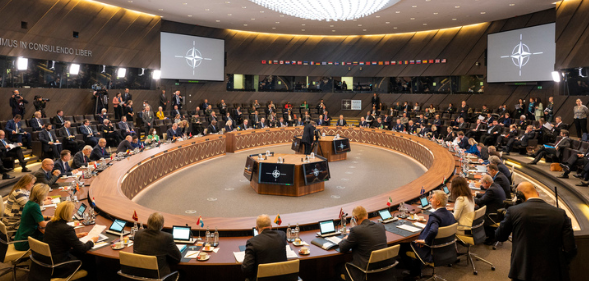
The North Atlantic Council chamber, Brussels, meeting on March 16, 2022.
“Unfortunately, even those US troops now on the eastern flank have never been placed under NATO command. Thus, the Alliance’s nerve centre or command structure has not been mobilized to coordinate the actions of the NATO Response Force, which also has not been deployed. So what if we have 40,000 men in NATO? What are the Response Forces if they haven’t moved? And have you heard that the famous NATO Spearhead [Very High Readiness Joint Task Force – VJTF] has appeared in Poland or in the Baltic States? Again, no. And yet it was created in 2014, after Russia’s war in the Donbass and the annexation of Crimea. It was supposed to react within 72 hours.”
“Question: Since 40,000 did not move, it’s likely 300,000 won’t move either, since even the Spearhead has not moved with the current state of leadership in the member states and NATO itself?”
“Gocul: Yes. It is not a question of the number of forces announced, but of the lack of a decision to deploy. It is similar with our army – the key is not whether we have 100,000 or 300,000 soldiers, but what capabilities the Polish military has and whether it has the ability to stop a Russian invasion. Let’s forget about the numbers. When humans fought with stone spears, the actual number was decisive. But not now.
You complain, and [NATO Secretary-General] Jens Stoltenberg has announced: “The NATO summit in Madrid will be groundbreaking. With a new strategic concept, we will make a fundamental change in NATO’s deterrence and defense.”
Before the NATO summit in Warsaw [in 2016]), at the Pact’s military committee, I asked Stoltenberg: what will be the guarantees for the eastern flank? He replied with a question: what else does Poland expect? I said straight out: security and prosperity, which is what the rest of us sitting at the table want.”
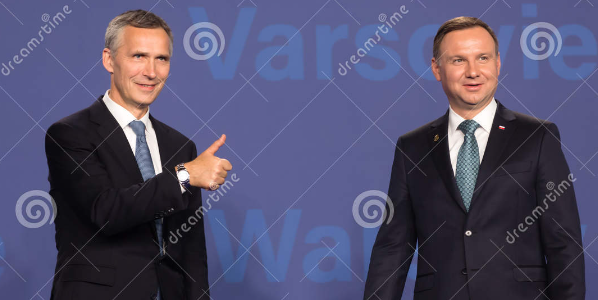
Stoltenberg and Duda at the NATO meeting in Warsaw, July 8, 2016.
“Just like then, I hear the same slogans today, such as ‘do more with less’. There are also other fine-sounding calls, but these are only political slogans calculated for a positive public reaction and minimizing costs. They do not really bring about any political and military solutions.
No breakthrough in NATO, even if there is a real risk of a war with Russia?
If Stoltenberg says it will be a turning point, it is probably only so for him. But that’s because it will be the last summit for him as the head of the Pact. The summit will definitely not be a breakthrough, because – first of all – NATO does not want to take a big step forward.
What should happen for a breakthrough to become a reality?
Let’s be honest: if there is to be a breakthrough, we should have 360 degrees of security for the Alliance – on each of its borders. And let’s also honestly answer the question: is the eastern flank safe? are Poland and the Baltic states safe? Well, we are not safe – NATO does not give us security now and the current summit in Madrid will not change this. And yet such slogans – of total security – had already been voiced at the previous summits of the Pact in Brussels, Warsaw, and Newport. They always ended up with security slogans. This time it will also be like that.
Now the tension between Russia and Lithuania is growing, because the sanctions are blocking the Kaliningrad Oblast more and more. Could this be a hotspot?
If Putin wanted to start the war further and decided to cut a corridor through the Baltics to the Kaliningrad District at the Suwałki Gap, what forces could stop him? Could the forces of Lithuania, Latvia, Estonia and Poland stop Putin? Not at all. Putin will not be stopped by the Americans, who are present on the eastern flank only in small numbers. I repeat, Russia talks and calculates only with strong countries and organizations. And NATO in our region is weak.
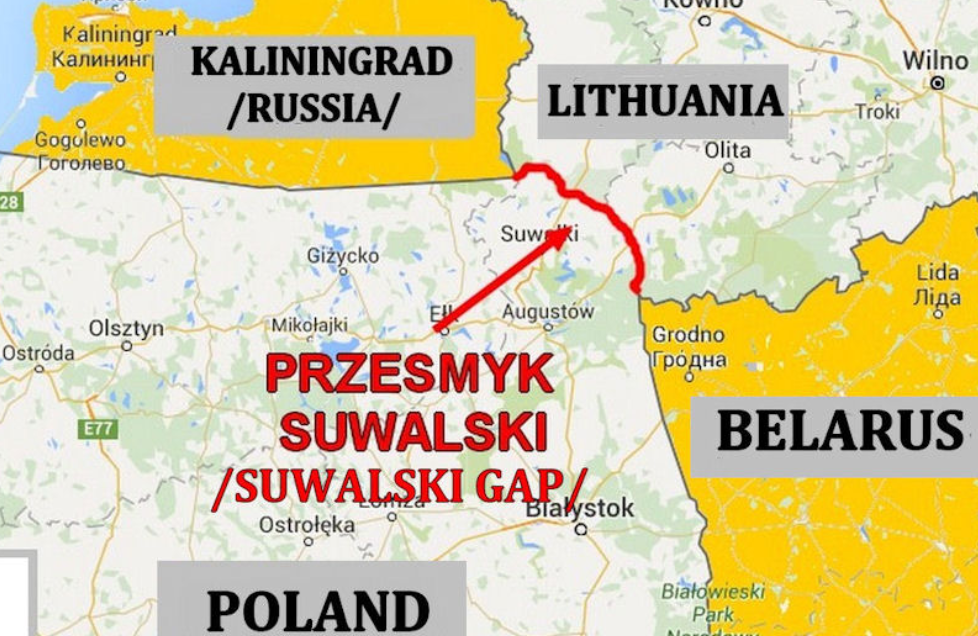
Source: https://www.globalsecurity.org/
NATO is not strong on the eastern flank, but does it have enormous potential which it does not want to transfer to our region?
NATO has military potential, but does not have the political potential to use it to build real security in our part of Europe. European leaders are not equal to the task. I don’t want to criticize individual leaders, but the role of statesmen is to make difficult but necessary decisions.
These leaders do not seem to understand that the war in Ukraine has already caused hundreds of billions of euros in damage, and will still bring trillions of damage to the entire world. It will also bring hunger and the millions of victims of hunger that Russia is blackmailing the world with. If the leaders thought seriously, they would very quickly make decisions about the forward and enhanced presence of NATO on the eastern flank, so that it could carry out specific operational tasks, which we are able to precisely define to ensure security. However, for this to be possible, a NATO division should be stationed in Poland.
After the NATO summit in Warsaw, we formally created an international division in Poland – it should be linked to the chain of command and be subordinate to the Multinational Corps Northeast in Szczecin, which is a rapid reaction corps. And this corps should be subordinate to the Allied Command of NATO’s Joint Forces in Brunssum, so that NATO would be responsible for the security of the eastern flank.
And what would result from this?
And the fact that the allied troops arriving on the eastern flank would be tied to the NATO chain of command. Today, after all, the battalion battle groups present in Poland, Lithuania, Latvia, and Estonia as a result of the NATO summit in Warsaw are not even commanded by NATO, but by the individual member states. Everything should be tight, but it isn’t.
The Estonian prime minister says: ‘Estonia [in the event of an attack by Russia] would be wiped off the map of Europe and its capital razed to the ground’, so NATO’s strategy follows the principle of ‘lose and then liberate’. And this is what it would be like in the event of the Russian invasion of the Baltic states?
This, unfortunately, is true. But let’s start with the basic thing: what is the definition of security? It is the freedom to choose the path of development of the country. After all, what we have today on the eastern flank – in Poland, Lithuania, Latvia, Estonia – is a contradiction of security. There is no free development; there are a lot of restrictions; there is a huge pressure to increase defense spending. And if there is no security, it means that NATO is not meeting the goals set out in the Washington Treaty, so NATO is not a strategic concept today…
And in your opinion today is it fiction?
If Stoltenberg is reading correctly the Treaty and the Charter of the United Nations, to which the preamble to the Treaty refers, then he should be aware that NATO was not created to reflect NATO territory. And today it would be forced to do so, because it is not able to defend the territory not only of Estonia, but also of Poland. It must be emphasized that NATO was created to defend NATO territory – to prevent the conflict from escalating and, as a result, from taking over at least part of NATO territory by the enemy.
However, there were already a great many declarations that NATO would defend every scrap of the territory of a member state. In fact, it is impossible?
Today, NATO is actually saying we will not give up any land to Russia. However, this is a fairy tale, and Putin probably scoffs at it. Because what did NATO – apart from the rhetoric and Stoltenberg’s many meetings — do about the war in Ukraine? NATO has a Spearhead – it did not send it. NATO has a Response Force of 40,000 troops — they didn’t move. NATO has a command system – it has not moved. And if NATO wants to increase its Response Force to 300,000 or whatever number someone thinks would be right, that sounds like a joke, because the 300,000 wouldn’t move either.
One should also pay attention to the condition of our army, which would also have trouble moving. The operational units are stripped by the territorial defense forces. We have a shortage of officer cadres, problems with mobilization, and a broken crisis response system. We have announcements of huge purchases of weapons and the propaganda creation of a new division, but I dare to suspect that we are not able to deploy as many highly completed units as we declare for the NATO table of forces.
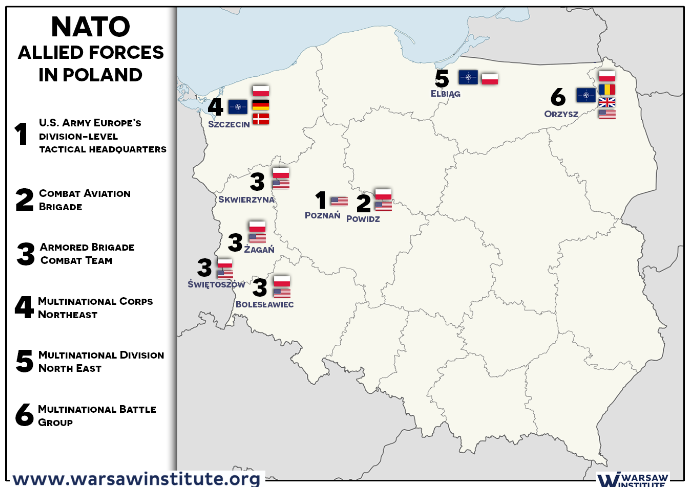
Source: https://warsawinstitute.org/
You paint a dramatic picture of the lack of determination and strength of NATO and the Polish army.
…. At the plenary session of the NATO military committee – before the summit in Warsaw – I argued to the Americans: if you want a NATO Response Force in Spain, they will sleep in their shoes and with rifles in their hands, and they will come to Poland too late anyway. I proposed: the forward presence of these troops on the eastern flanks is needed, so that the soldiers sleep in their pajamas, train and relax, but if there is a threat, they will get dressed in one day, have time to eat, get their equipment and go to the front.
It took Putin over a year to collect 150,000 soldiers on the border with Ukraine – maybe this is the time to transfer NATO troops from Spain or Italy to the eastern flank?
I will answer without violating the official secrecy. There once was an incident in the Baltic Sea when over 30 Russian ships suddenly appeared on it [Exercise Ocean Shield 2019 — https://thebarentsobserver.com/en/security/2021/07/northern-fleet-warships-will-conduct-tactical-exercises-around-scandinavia . Total surprise. And yet ships at sea are not a tank that can be hidden in the forest. If more than thirty such ships went to sea and NATO knew nothing about it, will NATO be able to react quickly enough when Putin really wants to attack?…
So are NATO guarantees mostly on paper and there’s little response capacity?
If anyone says that by increasing the declared number of soldiers of the NATO Response Force to 300,000 and also that we want to increase the size of our own army to 300,000, we will ensure our own safety, that’s talking nonsense. If someone says that the Polish army will be so strong that it will win a war with Russia, that is also gibberish. In fact, even with these numbers of NATO forces on the eastern flank and of our army, the Russians will demolish the country.
I am very concerned that the NATO summit in Madrid is going in the wrong direction. Instead of looking for ways to win peace, because this is the crux of the eastern flank problem, the summit is to convince us that we will win the future war if, or rather when, it occurs. This rhetoric ended as we see it in Ukraine.
However, it is to increase support for the eastern flank.
But it will only cement the status quo. And the status quo is that NATO has done nothing to prevent a future war between Russia and NATO on the eastern flank.”


In Poland we have a saying, “you know how to count? Count on yourself”. To bad we don’t do it when it comes to our security despite our earlier experiences with western alliances.
But then again, we have a political class, that is no different than US political class – abuse whatever grievances voters have to whip’em up into a mindless frenzy, and steal everything that isn’t bolted down in the meanwhile.
The end result – hollowed out industrial base, hollowed out military and severely deteriorated society. And now that Russians have been goaded into war, well, everyone has their pants full.
I think it was Donald Fagen of Steely Dan who said in an interview that parody isn’t effective today because reality is much more ridiculous than you can fictionalize
Hating this war for a lot of reasons, but this kind of waste isn’t surprising.
However, event though I’ve written some parody pieces where the imbecile in question pretends they are helping as they totally screw someone over. It’s so weird that it is happening that way right here, right now.
This version of NATO certainly is special in it’s own way
A lot of Western (US certainly) politicians are doing the same thing in domestic politics. Grand rhetoric, but no action, or actions are so slow and full of fine prints that they are worse than useless, yet it doesn’t stop them from crowing loudly about how wonderful they are that they are “doing” whatever they say they are doing.
I understand that John Stewart gave the difficulty of satire in a ridiculous world as an impetus for retiring from The Daily Show. I’ve seen several comedians lament the death of satire due to its declension into simple news-reading of the bitter truth. Cancel culture tries to nail the coffin shut at times…
Amazing that Europe is ‘afraid’ of Russia, while in the meantime it is the US Empire which is bleeding them dry by causing a crisis and then selling them very expensive but totally inferior weapons, and finally using sanctions against Russia to destroy Europe’s industrial capacity
The Poles really should make peace with the fact that they’ve signed themselves up to be ground zero for the fighting if it comes to a hot war with Russia. Putting significant forces and equipment on the Polish border in a twenty-first century Maginot line as this Polish general suggests is strategically senseless and insanely provocative. Build bunker space for 40 million if you really want to prepare to fight a war with the Russians.
The generals musings reminded me that lately I’ve come to the conclusion the NATO focus on “unified command” and standardization of every aspect of armed forces is very much misguided. It’s creating more problems than it’s solving, as most bureaucracies do.
Of course there should be ways to collaborate between the members, but only to the extent required. The need to make Norwegian and Spanish units to work together forces the Polish army to adopt standards and command structures that are not well suited for the problems Polish Armed Forces are facing. Even if there is really no realistic scenario of armed conflict where Spanish or Norwegian troops would fight in Poland en masse.
Compare that to the “Allied” forces fighting in Donbass: Luhansk militia, Donetsk militia, Russian armed forces, Rosgvardiya, Chechens (separate command structure from Rosgvardiya) and Wagner Group. That’s six command structures, six support infrastructures, six ways of fighting and yet it seems (I’m sure there’s a lot of friction we’re not seeing) they can all work together effectively towards a common goal, and it even seems that they are all fighting to their strengths, changing responsibilities, roles and sectors more or less fluently.
Of course it helps a lot that almost all of them speak Russian, but that comes handy only after the organizations are flexible and fluid enough to allow local commanders to collaborate, innovate and solve tasks based on the local situation and resources available. That requires experience, trust and leading from the front.
Maybe what is needed is to divide NATO up into regional commands. So you would have a western command (Spain, Portugal, etc.), central command (Germany, Balkans) southern command (Italy, Greece, etc.) and of course an eastern command. The eastern command would be made up of all those countries that really want to fight Russia – countries like Poland and the Baltic States. Then tell eastern command that if they really want to fight Russia, then go for it. But don’t expect countries like Spain or Italy to do your fighting for you.
The problem with that idea is decentralized/regional control means the US is not in control and as you point out, no unified response structure. The US, like a spoiled, foolish child, needs total control of all its interests. Just look at how anyone who tries to chart an even slightly divergent path is treated: coups, assassinations, economic terror. And its supposed to give up even a little control of its favorite terror force?
I doubt NATO would’ve really functioned to stop the Soviets last century. Now in its hollowed out state and with corrupt and weak leadership in the west generally, its hopeless. Russia knows this and frankly, if they wanted to take the Baltics, Poland, etc, they would. They do not. But apparently Sweden and Finland, as well as the rest, are doing all they can to goad Russia into doing exactly what they say they fear. My hope is the Russians can keep their hottest heads cool so we don’t stumble into WWIII. If I’m gonna die in a Manhattan fireball I want it to at least not be due to a lame comedy of errors. Are we really living in a Kurt Vonnegut story simulator?
Maybe what is needed is to keep dividing NATO up into smaller and smaller pieces until it disappears into the dustbin of history, as it should have back in the 90s. Yeah, Sleepy Joe still owes me $600, but Slick Willie still owes me my Peace Dividend.
In the Cold War, of course, NATO had a complex operational structure in Europe under SACEUR, with subordinate North, Central and South commands, and a whole series of subordinate commands and multinational Corps-level units and air elements. This was because NATO envisaged (correctly, it appears from Soviet archives) that a future conflict with the WP would involve all parts of Europe and all NATO nations. It was therefore essential that multinational commanders have units from different countries under their command, that used the same doctrine. Of course, we are talking here about massively larger forces than are being used in Ukraine: the British Corps alone would have had a strength of 90,000 on mobilisation. It’s also possible to over-estimate the amount of standardisation actually achieved: the joke at the time was that the only thing ever really standardised was the coffee. But much of it was about interoperability: Spanish and Norwegian maritime patrol aircraft worked together on ASW, for example, because they had the same procedures and were able to communicate voice and data to each other. That’s the way NATO would have to go if it plans to build itself up again.
But is that even possible? The penny has started to drop that NATO’s economic and production base is a shadow of what it used to be, and that there’s not a lot that can be done about it. The RUSI paper discussed last week, and other similar studies show, I think, that its effectively impossible now to rebuild the military structures even of a generation ago. And unlike the Cold War, the only plausible theatre of conflict is in fact Poland, and for the West to deploy and sustain large forces there would be an operational and logistic nightmare. Like some of those quoted in the article, we should accept that NATO can’t win militarily, and should stop trying.
This made me recall how this communication problems resulted in bad coordination of control on EU fisheries. Something as simple that country A was unable to decipher information given by country B about one of her flag fishing vessels for instance. Because file formats used by both authorities were different. The EU had to do an effort to make everyone work in the same format at least for exchanges and it took its time.
I seem to recall reading something similar involving drivers licenses, that was undertaken after the Irish Garda was puzzled how they could ticket the same polish drivers in multiple parts of the nation on the same day.
Turns out the officers had confused a label for the driver’s name.
Thank you, David, but where’s the money / profit / fun coming from if “we accept that NATO can’t win militarily, and should stop trying”?
That’s why contractors / Wall Street investment firms like Carlyle and Kohlberg Kravis Roberts employ former commanders like James Stavridis* and David Petraeus* and fund the Atlantic Council*, Council on Foreign Relations* etc.
*None of whom declares the interest or asked about it.
“Economic and production base?” That sounds like heresy!
The only war NATO states will get is the class war that’s going to be unleashed this autumn and winter around Western Europe
Thank you, OS. That would be splendid, but I am not hopeful, so not going long rope, alcohol, glass and cloth.
That is basically the same problem as EU has.
Sure, standardize products (STANAG equipment or EC consumer products). But leave it up to the locals to figure out the rules and regulations for the local area already.
hello, I am a soldier of the 9th People’s Militia Regiment of the DPR. We were advancing from Novoazovsk to Mariupol. For the first three weeks, we advanced only on our own, with our tanks, artillery, infantry fighting vehicles. We had our first interaction with units from Russia in the suburbs of Sartana, it was a detachment of rosguard from Chechnya. While we were fighting in the suburbs, the Chechen forces were at a loss, because these are police anti-terrorist units, and at this stage the war was predominantly artillery. It was difficult for light infantry without armored vehicles, but when the fighting began in urban areas, they showed what they were capable of and were very effective. Toward the end of March, we joined up with marines from the Crimea and together carried out the blockade of the Ilyich plant, after that the main forces of our regiment were replaced by the Vostok (DPR) and Sparta (DPR) battalions, and we went to rest. After the battles for Mariupol, our regiment was staffed with conscripts from Donetsk, so for the next month and a half we were engaged in their training, and the arrangement of defensive positions on our sector of the front near Volnovakha, we no longer participated in assault operations and did not interact with other allied forces. from my story you can get an idea of the interaction between the units of the allied forces. It was minimal, since the basic structures are very self-sufficient and autonomous, if necessary, they receive light infantry reinforcements. In my case, we were supported by the Chechens of rosguard. Popasnaya was stormed by the RF Airborne Forces + PMC Wagner support. Severodonetsk is a corps of the People’s Militia of the LPR + volunteers, who are formed and trained by the “Russian University of Special Forces” in Chechnya
Thanks for this. Very informative.
Am I missing something? I was under the impression that Ukraine was not part of NATO so how can he accuse NATO of giving up land to Russia? He might more accurately have said, “We want NATO to light the fuse that will unleash a nice warm holocaust by military involvement in a NON NATO country that is not threatening a NATO country and then somehow put a protective umbrella on Poland so it will have no fuss and no muss when the temperature gets close to that of the Sun.
Helmer is repeating a NATO statement from the meeting they just had. You are shooting the messenger:
https://www.nato.int/cps/en/natohq/official_texts_196951.htm
I don’t see what you are objecting to. If you read the entire NATO statement, it is clear they regard Russia as far and away their biggest threat.
As an aside, NATO also picks up the sexual abuse war crimes claim when Ukraine was caught out fibbing about that. NGOs that assist victims went looking for them and couldn’t find any. The official who promoted that fiction was forced to resign and she later issued a statement admitting to the fabrication but arguing it was justified.
Ukraine has been NATO-lite. Scott Ritter has explained repeatedly that the UAF since 2014 has been trained to NATO standards and its units are supposed to be interoperable with NATO units. NATO members have been sending equipment to the degree that they have demilitarized themselves to a significant degree, even before getting to the fact that they didn’t have the artillery and heavy equipment for more than a short war.
Russia has said if any country sends men or equipment to Ukraine, they’ll be subject to attack as soon as they cross the border.
“…UAF since 2014 has been trained to NATO standards and its units are supposed to be interoperable with NATO units.”
Yup.
And it’s worse than people want to let on.
https://ucpbacalgary.ca/event/march-31-2016-one-canadians-experience-training-the-azov-batallion-to-nato-standards/
The quote is from Gocul, not Helmer.
wow, even with German expulsion, communism, and 30 years of post-communism….one can see the imprints of the old pre-1939 German-Prussian borders on that presidential election map (the orange)
presuming it is partly the impact of geography/interacting with western neighbors, and some faint cultural imprints of Prussian culture that still manage to live on
Thank you, LF. I noticed that, too.
I have seen this sort of map with the railway system. The railway system in what were Prussia, Brandenburg and Silesia was much more developed compared to what was Austrian Galicia and Russian Poland.
On the subject of logistics, it helps explain how Germany could get troops from the Marne and Somme to Tannenberg and the victory achieved by the aristo field marshal who often called his eventual successor an Austrian and Bohemian corporal.
Thank you Colonel.
Voting pattern map shows the division between former Prussian and Russian partition, the latter being so called “Congress Poland” which considers itself the real continuation of the old republic. The prussian part doesn’t necessarily have that high of an opinion about it (a joke: What’s the best thing in Warsaw? – an evening train to Poznań).
Somewhat connected issue if we talk about maps. A notorious map of Polish Railway that is a shame of our post – soviet regime:
https://imgur.com/a/TJ0aQ4c
Thank you. I am very grateful.
Have a look at railway maps of Ireland, France and even Mauritius from the mid / late 19th century and now and weep at the so called progress.
thank you for sharing your rail observation…
presumably, the more you meet random strangers over your life (thanks to easier travel access)—even if it is your own nationality, the more you develop a humanistic view of the world?
Thank you. I think that is true.
I would love to cross Russia by train and take a detour to Central Asia. I used to work with Russian Railways at HSBC, 1999 – 2006. Happy to travel with company.
Fascinating. Thank you for the insight! I vaguely remember something about major water transportation routes in early to mid 19th century shaping American politics for the next 100-200 years, but how transportation routes shape histories is something that I’ll have to keep a close look at!
Those major transportation routes IE the Mississippi are in all likely hood to be puddles 1-200 years out.
You put a bacteria in a microscope and will inevitable find an East/West divide. The east side of SARS CoV viral particles is, almost certainly, the most damaging. One day we will realise that even atoms are divided in their US’s side and Russian side. ;)
Yeah. I was stunned when I saw that. Must be something in the waters of Posen.
Does make me question how strategic this strategy is. If all the signals are pointing to a confrontation with China and Russia at the same time then protecting the new Iron Curtain border to keep Europe pure and faithful is a must. We’ll be able to harass Russia’s most populous cities from Poland – better than from Ukraine. The big problem with this half-baked plan is that every US service man and woman is now fully aware of the horrific defeat Ukrainian troops and mercenaries have suffered in spite of unlimited supplies of NATO weaponry. The implication is beyond obvious. If the US military thinks it can draft 300,000 troops to go to Poland and become sitting ducks, they are probably miscalculating. I’d become a devout Quaker that very day. Not to even mention the little fact that there won’t be any diesel.
If only.
Looks like NATO is close to running out. And much of it had been mothballed so long that a solid portion of it didn’t even work (if the reservist that got some fancy toy handed to him could understand the manual in the first place).
Never mind that we are not even sure if NATO even has the capability any longer to produce replacements without some vital components coming from China.
Beancounting a war didn’t work to well in Vietnam, and it certainly will not win WW3.
Indeed, most military histories of the German-Soviet conflict make the point the the SU didn’t simply outfight the Germans, it out-produced them. The Russians Have Lots and Lots of Everything. In a war between a country with a month’s stock of equipment and ammunition, and one with a week’s, the first wins. Not just, but overwhelmingly. That’s what any future conflict with Russia would be like.
Well, not entirely: Soviets lacked a lot of key war materials–aluminum, certain refined petroleum products (esp av gas), trucks, boots, processed foods etc. While Soviets would have certainly been able to prevent German defeat by themselves, they probably would not have been able to match to Berlin. BUT what I am curious about is who the modern equivalent of WW2 USSR is. Does US and Western Europe produce “trucks and boots”? Their military leadership has been decimated by purges in service of political ideologies. While the Frontline toys are (at least some of them) as impressive as T-34 was in 1941, the supporting structures have been gutted (Glantz and House note how Soviet mechanized units in 1941 had lots of tanks, often very modern tanks–they had more T-34s than Germans had tanks, period–but no trucks, spare parts, or maintenance crews.), and so forth. And we have no one to lend lease us the trucks and boots (the Chinese and Indians now make a lot of them, and we are not exactly friendly to them…)
Depends on how messed up the supply chains are.
There are at least two companies in Sweden and one in Germany that i can find in Europe alone that do trucks right now. But the question is how dependent they are on Chinese parts. Never mind if they have the ability to scale up in case of a multi-year slugging match between Russia and NATO.
That’s really what I was wondering about: cutting out China and India altogether from almost any major industrial production today seems difficult, even if manufacturers might be located in W. Europe or N. America. I was reminded that something similar did happen during WW1, with Germany and Britain relying heavily on imports from each other for their industrial production until the war broke out (German steel and British coal, for instance), and I’m trying to think how things would be different today (or if) from back then.
What was the combat half-life of a T-34?
Also, in the west we tend to regard industrial production and combat activities as completely distinct categories. It’s not clear to me that they are though. I wonder what the Soviet take on this was.
prevent German victory rather–I originally wrote “defeat Germany” then changed mind since I doubted if the Soviets would have been able to march all the way to the Elbe without Lend Lease trucks, canned food, and av gas, but didn’t change the wording correctly.
They are paying 35,000 cash as an enlistment bonus and they are accepting neck and arm and hand tatoos which they stopped doing a decade ago. And they are excusing prior felonies in many cases, and certainly misdemeanors. That is a pretty good deal for an illegal alien who then gets citizenship for him or herself and the entire family.
While everyone is looking at Poland and the Baltic midgets, a Balkan midgets is stirring up the pot. Yesterday, in one of its last acts since the vite of no confidence against it, the Bulgarian government ordered the expulsion of 70 Russian diplomats, today the Russian Embassy has issued an ultimatum to rescind the order or risk response up to and including breaking off diplomatic relations. Russia did have a hand in bringing down the government, but what I see emerging is a dangerous game of escalation on the part of the US by using midget proxies to try to goad Russia. Let’s hope that Moscow has cool and smart heads in charge, as it is obvious that the US does not, and the EU itself is thoroughly unable and unwilling to act on behalf of its own interests.
The most simple solution to all of this would have been all the Eastern and Central Eastern European countries to declare neutrality after the collapse of the USSR. If Ukraine was neutral and acted like it, Russia wouldn’t have been able to invade with Chinese backing or most of the world sitting out sanctions.
A neutral eastern Europe would have provided a very effective cordon from Russia for Western Europe while also functioning as an economic bridge. Not to mention how much more developed Eastern European economies would likely be this many years on. But the US/UK really needed to be able to threaten Russia, so the best interests of those nations were subsumed to the geopolitical interests of other nations. Maybe Eastern Europe will figure out that the US is not their friend someday, but probably only the hard way.
Here’s a choir singing the praises of the dark side. It highlights the news on this topic.
Watching the report of the NATO conference on the Spanish TV last night, I had the feeling that, in spite of the Rah Rah that is the official line, there was a feeling that during Stoltenberg´s talk, he had said too much. He had pushed the sales pitch just over the edge and the mark now can see that he is being sold a load of hooey. The grandious talk of bringing peace to the Saheal and Asia was over the top. The body language and facial expressions of the TV reporters also was a tell. They were talking the talk and spouting the party line, but . . . . And this is in Spain, which has a really bad case of the Stockholm syndrome.
As to what´s to do? What´s to become of NATO? As has been said, its purpose from the beginning is to keep Germany down, Russia out, and the US in. The Europeans – even the Spanish – are worried about their security. They need to look at the protagonists. The Chinese? Not to overgeneralize, but they are a mercantile people. They want to do business. Even in the tiniest little town in deep rural Mississippi you will find a China store. They are everywhere. They get along, The Russians? The bear is a good image, It is a big and diverse country that has been cobbled together over the years, but has a surprising degree of cohesion. They have a rich cultural heritage that they value. They certainly do not neeed more territory, they have plenty to keep them busy with what they have. Their military structure is defensive. They mostly just want to be left alone. The truly warlike and belicose nation among the big powers is the US. NATO has served as a means to continue the military occupation of Europe and even expand it. NATO and the EU have imposed neo-liberal economic policies and control the foreign policy of all the member states (the hostages). Can´t forget the Europeans, Most all of them have had their empires, The British, French, Spanish, Portugese, Belgian, Polish LIthuanian, German, Austrian, and on and on. Some of them pine for thier lost might (this longing for the glory days is typically a factor in the rise of Fascist governments )Hitler, Musoline, Franco). They have allied themselves with the current bully of the playground hoping to get some scraps out of the deal. Given the existing conditions, the most useful role for NATO should be to keeping peace among the occasionally restless Europeans. They should give up trying to fight a conventional war with Russia. As the post has pointed out, they can´t win. NATO should, with or without the US, reach some agreements with Russia that provides security for all. Disarmament. It was recognized seventy years ago that a land war in Europe was insanity, somehow the US has managed to shake the boogeyman enough for the foolish European ¨leaders¨ to forget it. As those more knowledgable than me have pointed out, the future for Europe lies to the East and not the West.
Thanks for the take on the reactions to Stollenberg.
The map of the RO voting districts follows the 1939 German-Polish border. Poles from the east were resettled into areas the Germans were expelled from after WWII. They vote RO. The two bright RO dots in the southwest on the Oder are the former Breslau (now Wroclaw, a coal mining town) and the old Herschberg, a German, Protestant, textile town with a Polish village hinterland. The new name is the old one in Polish- Jelenia Gora.
So the RO areas are more interested in Germany than Russia and get the majority of the industrial spill-over from high-wage Germany. Thus the RO dot in Warsaw. Western Poland is now part of the German East-European Co-Prosperity Sphere. Plus the old Prussian Pre-1914, “Guns of August” railroads still run conveniently east-west. They now carry parts for the German industrial supply chain instead of Prussian infantry regiments.
The Pis-voting areas in the east are the old Polish village heartland. So every now-and-then when the Ruskies and the Germans decide to fight, Poland makes a convenient battleground. These people are cynical and realistic; the American army is as likely to protect Poland in 2023 as the French army was in 1939. Geography’s a bitch. Joining an American project to fight and win a war in Poland is, as the Estonian leader pointed out, an American formula for losing the first round and eventually taking the place back later. Wonderful; Poland gets two wars, just like it did in 1939 and 1944-5. The Poles remember what Warsaw looked like in the spring of 1945 and have no urge to go there again. So, as the former Polish Army Chief of Staff pointed out, making peace with the frightened neighbor to the east who has lots of guns seems pretty reasonable.
And both RO AND Pis voters are more worried about invasions by the Third World and the European Court in Strasbourg, which wants to turn Warsaw into a multiracial paradise like London or Paris. The Poles don’t agree on many things with their Hungarian neighbors, but on this one they link arms.
Finally, the idea that Gdansk (the former Danzig), the home of the Solidarity movement that started in the now half-abandoned shipyards there, may today be almost 1/3 Ukrainian makes me giggle. I expected the Polish Corridor that provided the excuse for WWII to remain either Polish or German. I never expected it to become a Ukrainian enclave practically next door to the Russian enclave at Kalinigrad. East Prussia rides again- this time filed with eastern Slavs.
The exit of the shipbuilding industry probably left an aging population and lot of reasonably empty 1960s apartment buildings for Ukrainian refuges to move into. The Baltic can be dreary. But in the summer, with 16 hour days and all those 4,000 person Stena-Link ferry-party boats going everywhere, it’s not bad. Not Odessa, but OK. And the beach near Gdansk has my all-time favorite name for a cloudy, cold, depressing beach resort; “Bad Karma” from Gravity’s Rainbow.
The Earth moves around the sun, money isn’t created the way you might think it is, and Russia has a lot more to offer the ruling circles in Poland and Hungary than does the USA.
Win over one and I bet you get both, which would look to be something close to driving a stake through the heart of NATO.
It’s worth bearing in mind that the people in charge of our foreign policy are the same bunch who contrived to lose Crimea.
All of this talk about NATO and what it will/won’t do reminds me of what Anatol Lieven said about NATO last February right after Russia’s invasion:
Lieven: I think this crisis is a paradise for NATO, for Western staff officers and military bureaucrats everywhere. It’s back to the Cold War: You move troops around on paper; you talk constantly about defense; you spend huge sums on exercises and papers and papers and papers and more papers, but you never have to fight! The NATO nightmare was Afghanistan, where you actually had to fight and face opposition from Western publics and [for European nations] did your absolute utmost not to fight—with the usual exception of the British. Wind it up and they’ll run.
NATO has made absolutely clear over and over again, just as the U.S. has, that they will not fight to defend Ukraine….
This is also paradise for the U.S. Army. One thing to watch in Washington is the struggle that goes on between the Army and the Navy and the Air Force about who gets most of the money…But once again, they don’t have to actually fight, because we’re not going to go into Ukraine and the Russians are not going to go into Poland.
We never had the slightest intention of defending Ukraine, not the slightest.
Here’s the link
If Poland doesn’t like NATO, Poland can resign from NATO, right?
If EUrope doesn’t like NATO, EUrope can resign from NATO, or dissolve it.
EUrope can dissolve NATO and create its own NEATO ( North East Atlantic Treaty Organization). Are the EUropeans really afraid that if they did that, that the US would go to war against the entirety of NEATO EUrope in order to make NEATO into NATO again?
NATO will “exist” until one member invokes article 5, only to get silence in response.
NATO disappearing would be the most desirable outcome. Since Poland was part of the EUro-British conspiracy to extend and unbalance America by sucking NATO eastward, it is rich that Poland is now unhappy at getting exactly what it co-conspired to achieve.
Oh! Is my Schadenfreudian slip showing?
I hope that America’s own Americaphobic EUro-Anglophillic elites are forced to pay for their role in all this.
Every time I have to go pick up something at a post office, while waiting in the queue I look at the newspapers at display, and they always have Warszawska Gazeta among them. And even from the front page it’s quite obvious it’s a far right (and I really mean FAR right), with a strong inclination to antisemitic rhetoric. It’s really a weird choice for a main source of information for an article…
Among other things that are deeply incorrect:
“Poland is already involved in the war in Ukraine as a logistics platform. It also has a war on its border with Belarus.”
There is no war with Belarus going on. What the nationalists in Poland mean when they claim there is “a war” with Belarus, they actually mean a (minor) refugee crisis, this year a few thousand people (mostly from Yemen, Syria, Afghanistan) crossed the Polish border from Belarus, and polish border forces mercilessly pushed them back, to the woods, in winter in temperatures way below zero (20 confirmed deaths, many more suspected). According to the right wing propaganda, this is a “hybrid war” that Lukashenka is launching against Poland.
Similarly, the only group of people in Poland who might describe Ukrainian refugees as “enemies” and compare them to Jews, is precisely the neo-nazi community. Seriously, drop Gazeta Warszawska as a source.
If you don’t believe me, just search for images of their front cover and translate, you’ll understand what I mean (the standard mix of accusing your political oponents of being Jews or Masons, anti left, anti LGBT, anti vaccine, anti abortion, pro Trump, pro church etc).
If you skim a sampling of the articles on:
https://militarywatchmagazine.com/
(which seems to be a reasonably impartial site) you will find that most recent western arms (tanks, planes, ships, et al) are inferior, sometimes grossly inferior, to Russian and Chinese equivalents. Generally this seems to be due to the difference between manufacturing for optimum usability, and manufacturing for optimum profit.